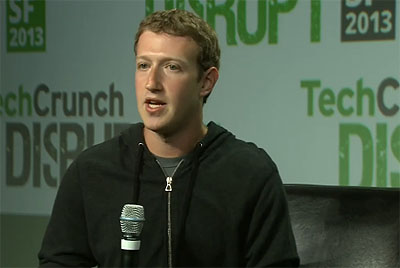Mark Zuckerberg probably isn’t America’s greatest spokesman for the value of allowing people to maintain their privacy. He is, after all, the guy who declared a few years ago that privacy was no longer a “social norm.” Nonetheless, at today’s TechCrunch conference in San  Francisco, Michael Arrington decided to ask him what he thought about all the recent revelations of NSA surveillance. Here’s what he said:
Francisco, Michael Arrington decided to ask him what he thought about all the recent revelations of NSA surveillance. Here’s what he said:
It’s our government’s job to protect all of us, and also to protect our freedoms and protect the economy—and companies. And I think that they did a bad job of balancing those things here. Frankly I think the government blew it. I think they blew it on communicating the balance of what they were going for here with this.
The morning after this started breaking a bunch of people asked them what they thought, and the government’s comment was, oh don’t worry, basically we’re not spying on any Americans.
And it’s like, oh wonderful, that’s really helpful to companies who are trying to serve people around the world. That’s really going to inspire confidence in American internet companies. Thanks for going out there and being really clear about what you’re doing. So I think that was really bad.
I guess the guy is consistent, anyway. As near as I can tell, he really doesn’t care about privacy. The only part of this whole episode that stuck in his craw was the NSA’s public statement that its mission is to spy on foreigners, something that he’s afraid will hurt Facebook’s business.
Which it might—though probably only slightly. Still, you’d think somebody in Zuckerberg’s business might have developed a slightly broader view of these things by now. There was more going on here than just a momentary breakdown in the NSA’s communications shop.

















